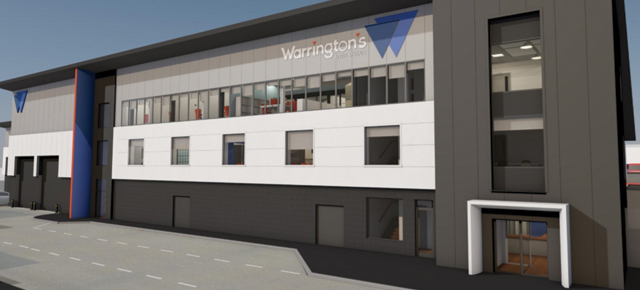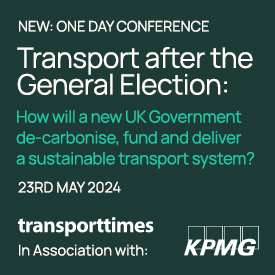Is this the most exciting green bus project in the UK? A new depot and a new fleet of 120 electric vehicles powered by a renewable source of energy

Warrington will soon become a showcase for green transport in the UK and beyond. The Cheshire town, which is home to around 210,000 people, is getting a fleet of 120 brand new electric buses – and the plan is for them to run exclusively on solar power.
Warrington Borough Council is perhaps in the unique position of owning its own bus company, Warrington’s Own Buses, and two solar farms, near York and Hull (with a third under construction near Cirencester). The plan is for these assets to combine so that the town’s local bus network uses 100% renewable energy. This will help the council to achieve its target of becoming carbon neutral by 2030.
In October 2021, the Department for Transport announced that Warrington Borough Council would receive a £21.4m ‘fastrack’ grant from the government’s Zero Emission Bus Regional Areas (ZEBRA) scheme. This will enable Warrington’s Own Buses to replace its entire fleet with 120 electric buses.
The investment does not end there. Warrington’s Own Buses was already getting a brand new bus depot thanks to funding from the government’s Getting Building Fund and the Towns Deal. The impetus behind this initiative was to free up the company’s existing depot at Wilderspool Causeway for a new housing development. However, the company and other stakeholders saw the opportunity to create a purpose-built, all-electric bus depot – believed to be only the second one in the country after Go-Ahead’s Henley Road garage in North Woolwich, east London.
Warrington’s Own Buses expects to move into its new home before the end of the year. Delivered by Warrington & Co, the council’s development and investment agency as part of its town centre regeneration plans, the facility has a 6 MVA grid connection that will enable all 120 electric buses to be charged overnight.
Ben Wakerley, who has served as managing director of Warrington’s Own Buses for almost five years, says that it’s a huge project for an SME. “We are really punching above our weight here,” he told Passenger Transport this week.
It feels like we are at the front of doing something that pretty much everyone else is going to have to do at some point, and not just for buses but everything. It’s exciting to be that close to the front of a project like that.
It’s a project that he is excited to be involved with. “It feels like we are at the front of doing something that pretty much everyone else is going to have to do at some point, and not just for buses but everything,” he explains. “It’s exciting to be that close to the front of a project like that.”
The tender for the new vehicles and chargers will go live very soon and delivery is expected during the second half of 2023.
“I think it’s going to get a very warm reception,” says Wakerley. He points out that Warrington’s municipal operator has traditionally purchased used vehicles, with the notable exception of 13 Alexander Dennis Enviro200s acquired for its Cheshire Cat network in 2018. “They were the first new buses that have been brought in in about five years, and that was extremely popular. So doing the whole fleet will be particularly good.”
Wakerley sees this massive new fleet investment as an opportunity to innovate. “What we want to do is try and embrace the technology that can go along with it at the same time,” he explains. “So we are quite interested in some of the things you can do with destination boards now. You can basically have full colour, full LCD screens … You can use that for marketing or route branding it’s like a step on from where we are now.”
The branding of these vehicles will be a case of evolution rather than revolution. “We have been trying to rebrand the company for the past few years,” Wakerley explains. “So it’s building on that rather than doing something completely different. It’s building on that and saying to people ‘now it’s electric’. That’s the way we are approaching it. The buses will really speak for themselves.”
Wakerley says that the impact of these new buses could be greatly enhanced if the council’s Bus Service Improvement Plan can secure funding. A key focus of Warrington’s BSIP was reducing fares (a Warrington’s Own Buses day ticket is £4.95 on the app and £5.95 on board).
“The biggest thing in Warrington is fares,” he says. “That is the biggest feedback we get, that people want the fare to be cheaper. And so if we can get the Bus Service Improvement Plan in and give people a cheaper fare with a better product across the board that’s well marketed, well branded and clean, then we think that they’ll come back on board.”
Wakerley says that this revival is important because Warrington suffered the biggest drop in bus passenger numbers in England over the 10 years to 2016. After 2016 it flattened out and there was a slight upturn before Covid. “Once people choose to go in a car instead it’s hard to get them back,” he says. “And that’s why I think you need the Bus Service Improvement Plan to do it.”
I think the public generally do get behind it, like with the David Attenborough documentaries and things like that. I think people believe we should be doing it. I believe we should be doing it
Does Wakerley believe that the network’s enhanced green credentials will encourage more people to use buses? “It counts to people more widely,” he responds. “I think the public generally do get behind it, like with the David Attenborough documentaries and things like that. I think people believe we should be doing it. I believe we should be doing it … I gave up red meat after watching Attenborough, it really affected me. So doing this kind of thing certainly resonates with me.”
He continues: “Do you change your name to show that it’s an electric vehicle? Does a customer care if you put on the cantrail ‘this is an electric bus’? I actually think in most cases they possibly don’t, but I think the public more widely do – or should do – and I think it is the right thing to do.”
What makes this investment in electric buses so interesting is not just the ‘big bang’ nature of the fleet renewal, it’s the source of the energy. Wakerley believes that this was important in helping to persuade the DfT to back Warrington’s ZEBRA bid.
Subject to agreeing on the price, the plan is for Warrington’s Own Buses to do a deal with its council owners to purchase solar energy. They will sleeve the energy so that it comes from 100% green sources. There will be no emissions in the power generation and no emissions at the point of use. “We are struggling to think of another example of a bus network of this size anywhere in the world where you could say that principle applies,” says Wakerley.
“It does still come down to a commercial negotiation. We would like to buy from them but obviously we are independent so it still comes down to that. But it would be good to do it because it’s the right thing to do, isn’t it, to buy green energy.”
This article appears in the latest issue of Passenger Transport.
DON’T MISS OUT – GET YOUR COPY! – click here to subscribe!








